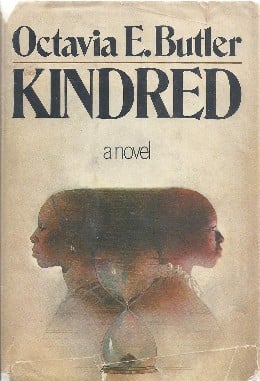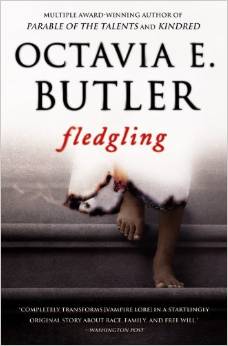Octavia Butler was born in 1947 in Pasadena, California. From a young age, her mother encouraged her love of stories and writing, from buying her a typewriter in her childhood to using money for surgery to support her writing. Inspired by racial segregation and the prevalence of the white male protagonist in science fiction, Butler turned her attention to speculative fiction. She studied writing at UCLA and the Clarion Science Fiction Workshop. She sold short stories to anthologies and eventually released a novel that would become the first in her legendary Patternmaster series. Butler published throughout the entirety of her life, even throughout a battle with depression and writer's block. Her impressive body of work earned her both the Hugo and Nebula awards. She is also the first speculative fiction writer to receive a MacArthur Fellowship. She passed away in 2006 at the age of fifty-eight. Her work continues to impress and inspire. Join us today as we look at some of her most important works.
 “Better to stay alive," I said. "At least while there's a chance to get free." I thought of the sleeping pills in my bag and wondered just how great a hypocrite I was. It was so easy to advise other people to live with their pain.”--Kindred
“Better to stay alive," I said. "At least while there's a chance to get free." I thought of the sleeping pills in my bag and wondered just how great a hypocrite I was. It was so easy to advise other people to live with their pain.”--Kindred
Butler's classic 1979 novel Kindred explores the harsh realities of slavery through the lens of her modern protagonist, Dana, who travels uncontrollably through time from her contemporary life to a pre-Civil War plantation where one of her mixed-race ancestors was conceived. Dana is forced to make difficult choices to survive while ensuring that her actions don't inadvertently prevent her ancestor's birth. This compelling, complex novel focuses on themes of slavery, generational trauma, historical erasure, and both black and female experiences of unequal power structures by critiquing history through speculative fiction. A portion of the novel was adapted into a television show in 2022 though it was cancelled before the entirety of the story was told.
"The world is full of painful stories. Sometimes, it seems as though there aren't any other kind, yet I found myself thinking how beautiful that glint of water was through the trees."--Parable of the Sower
Butler’s 1993 novel Parable of the Sower is the first in an unfinished speculative fiction series. Set in 2024 and structured as the journal of protagonist Lauren Oya Olamina, the novel takes on the very relevant issue of climate change, in addition to Butler’s common themes of race, power, and feminism. In a post-apocalyptic community, Lauren, who is burdened with a strong empathetic ability that enables her to feel the suffering of those around her literally, takes in the current state of the world and develops her religion based on the idea that humans must leave earth to survive. In 2017 it was adapted into a Hugo-winning graphic novel.
“Human beings are more alike than different—damn sure more alike than we like to admit. I wonder if the same thing wouldn’t have happened eventually, no matter which two cultures gained the ability to wipe one another out along with the rest of the world.”--Dawn
First released in 1987 as the first in her Xenogenisis trilogy, Dawn introduces readers to protagonist Lilith, a human kept and revived by an alien race called Oankali. The aliens have reformed an Earth ravaged by nuclear war and hope to meld their species together in a way that they believe will be beneficial to both races. Specifically, they believe that their combination will address what they perceive as humanity’s greatest flaw: a combination of hierarchical thinking. Written as a response to the Cold War and nuclear threat, Butler's novel is one of her first to address her feelings on hierarchical thinking, a desire for a pecking order she believed was the seed of violent behaviors of the type that led to slavery.
"He could not tell her he was angry because she did not love him. Even he could not utter such foolishness. Certainly, he did not love her. He did not love anyone except perhaps Isaac and a few other children. Yet he wanted Anyanwu to be like his many other women and treat him like a god in human form, competing for his attention no matter how repugnant his latest body or even whether he might be looking for a new body. They knew he took women almost as readily as he took men. Especially, he took women who had already given him what he wanted of them--usually several children. They served him and never thought they might be his next victims. Someone else. Not them."--Wild Seed
One of Butler's most well-respected novels is her 1980 release, Wild Seed, which was released as the fourth in her Patternmaster series but serves as a prologue. The novel introduces us to Doro, an ancient human born with the ability to hop from body to body through murder. Doro has been engaging in centuries of Eugenics when he meets Anyanwu, a woman with their own powers. Their relationship and struggle eventually lead to the establishment of the Patternmaster race, who maintain the highest position of power in the series. This afro-futurist novel offers a feminist alternative to the male-dominated science fiction and fantasy stories being released at the time, which is one of Butler's primary reasons for writing in the speculative genres.
 “Let them see that you trust them & let them solve their own problems, make their own decisions. Do that & they will commit their lives to you. Bully the, control them out of fear or malice or just for your own convenience, & after a while you'll have to spend all your time thinking for them, controlling them, & stifling their resentment.”--Fledgling
“Let them see that you trust them & let them solve their own problems, make their own decisions. Do that & they will commit their lives to you. Bully the, control them out of fear or malice or just for your own convenience, & after a while you'll have to spend all your time thinking for them, controlling them, & stifling their resentment.”--Fledgling
The last novel published during Butler's lifetime is Fledgling, a vampire novel released in 2005. Butler’s vampiric species, the Ina, are long-lived and can self-heal. However, they depend on human blood for this to be possible. Because the venom of the Ina extends the lifespan of humans, the two species have a symbiotic, though fraught, relationship. Protagonist Shori is the survivor of a brutal attack thought to be spurred on by her darker skin, which is the result of an experiment to make Ina invulnerable to light. Throughout the story, she pieces together her personal history and the rift that genetic experimentation has caused in her Ina community. The novel focuses on themes of race, alienation, and childhood.









